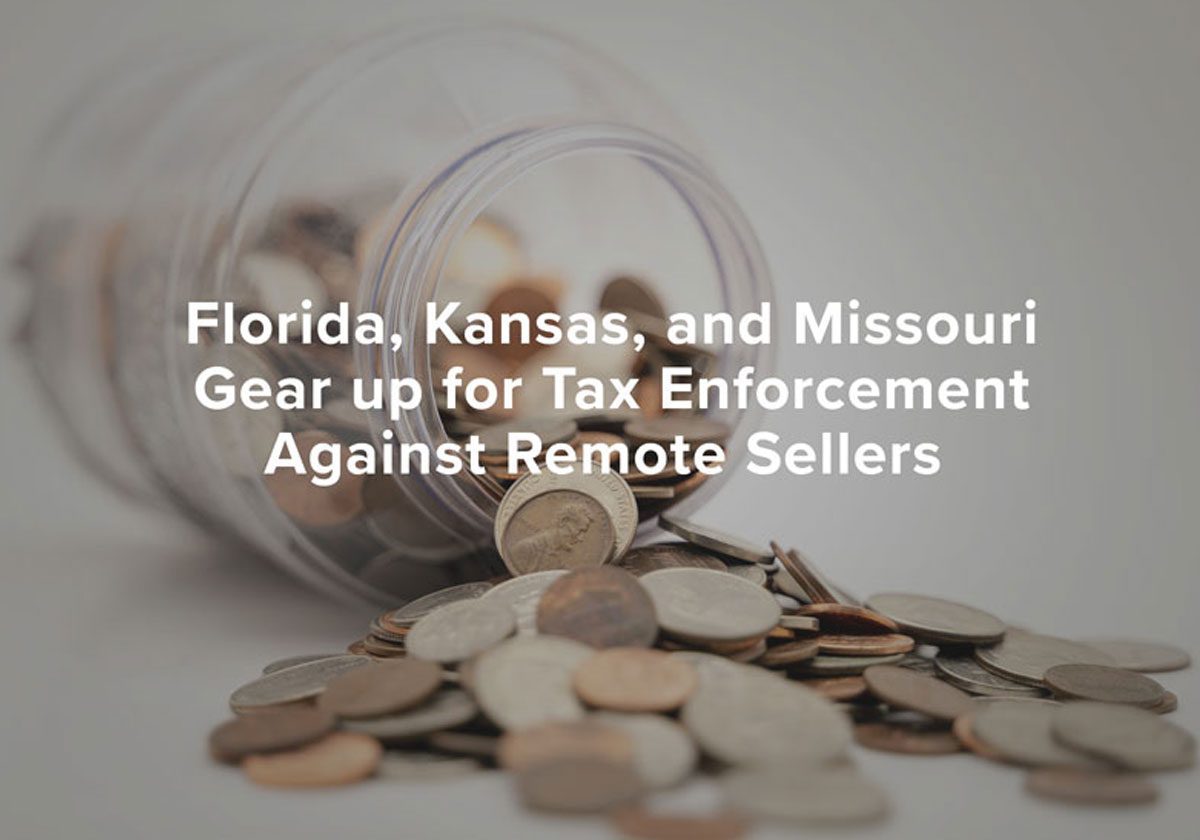The three holdout states – Florida, Kansas, and Missouri – have all officially enacted economic nexus statutes requiring qualifying remote sellers to register for sales tax collection. As of July 1, 2021, Florida and Kansas require qualifying remote sellers to register for sales tax collection. Effective January 1, 2023, Missouri requires qualifying remote sellers to register for sales tax collection. And although Florida, Kansas and Missouri have set their economic nexus threshold at $100,000 in sales, remote sellers should take note of some key differences in each state’s law to determine whether they have a registration and collection obligation.
A “remote seller” generally refers to a business located outside the taxing state who does not have any nexus with the state, except by means of selling/shipping goods and/or services to consumers within the state (“economic nexus”).
Florida
Effective July 1, 2021, remote sellers are required to collect and remit Florida sales tax, and any associated discretionary sales surtax, if they had more than $100,000 in taxable remote sales into the state in the prior calendar year.
While Florida did not incorporate a transaction count into their threshold, they did allow for wholesale sales (sales “for resale”) and exempt retail sales to be excluded from the $100,000 sales threshold. This means that sales to exempt organizations or sales of nontaxable goods and services do not count towards the new threshold.
Florida also provides for remote sellers who make sales through a marketplace facilitator to exclude marketplace sales from their $100,000 sales calculation.
Kansas
The Kansas Department of Revenue has overcome a previously failed attempt at imposing economic nexus standards on remote sellers by providing a small-seller exception in Senate Bill 50. The Bill, which was initially vetoed by Gov. Laura Kelly, became law on May 3, 2021, after the Kansas legislature moved to override the Governor’s veto. The Department began tax enforcement against qualifying remote sellers on July 1, 2021.
The state’s economic nexus threshold is set at $100,000 in cumulative gross receipts with no transaction threshold. Remote sellers who had sales into the state in excess of $100,000 in the current or previous calendar year are considered to be engaged in business in the state and are required to register for sales tax collection.
Missouri
Missouri will be the last state to impose economic nexus standards on remote sellers. Senate Bill 153, signed into law on June 30, 2021, requires remote sellers to register for Missouri tax collection on January 1, 2023 if they had over $100,000 in taxable sales delivered into the state in the current or pervious calendar year.
ZHF Observation
Florida and Missouri’s economic nexus provisions are more generous than Kansas’ and the vast majority of other states by only evaluating nexus based on taxable retail sales, as Kansas and most other states require businesses to evaluate economic nexus based on gross sales. By examining gross sales for nexus purposes, states cast a wider nexus net to catch more businesses, but arguably creates an unnecessary registration and filing obligation for many US companies who make 100% exempt sales.
As economic nexus laws become commonplace, and states develop audit programs focused on remote seller compliance, ZHF is seeing more and more businesses being contacted by states for nexus purposes. Businesses need to be proactive in evaluating their multistate sales tax obligations before they are contacted to take advantage of state-offered programs that can minimize tax obligations.
Wayfair opened the door for states to access significant untapped revenue; businesses that have historically been protected by physical isolation are no longer safe. ZHF has developed a proven path forward for businesses who need to evaluate their economic presence and potential sales tax exposure across the United States. If you are interested in discussing a sales tax compliance plan for your business, please contact Jason Walker, John Trippier, or any other ZHF professional.


